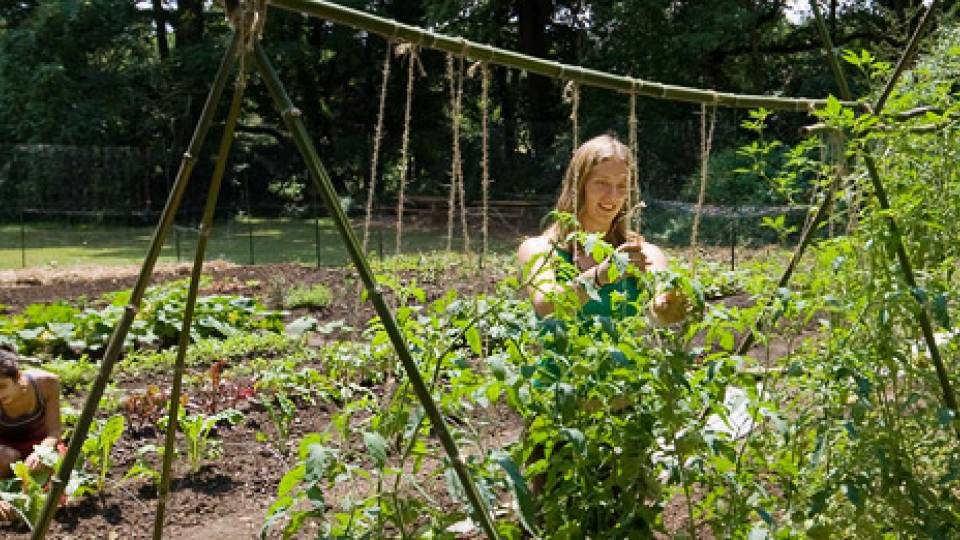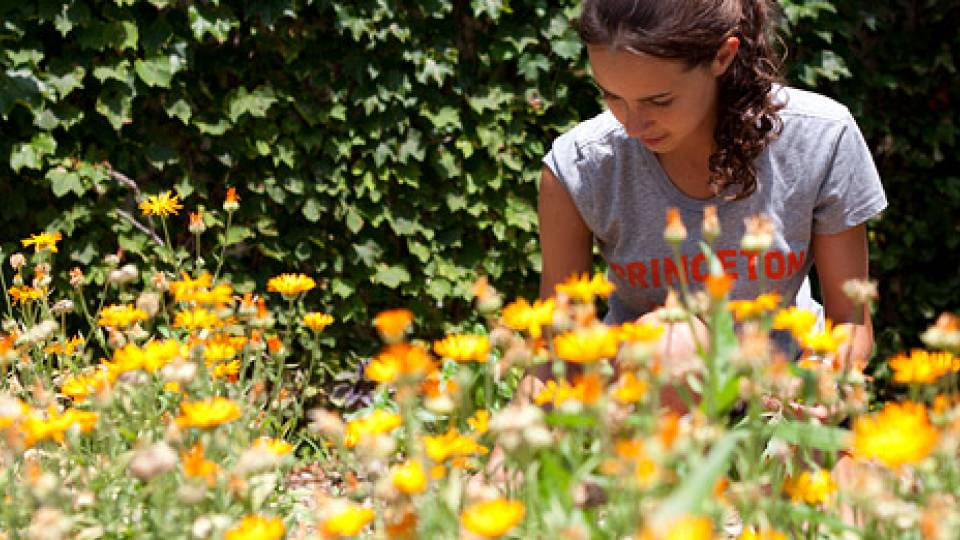The first round of initiatives has been funded under the auspices of the research, education and civic engagement section of the University's new Sustainability Plan.
Supported by a gift from the High Meadows Foundation, the nine projects range from a course that evaluates energy efficiency in local homes to a new sustainability curriculum for Outdoor Action participants to the installation of a student-designed garden at Forbes College.
"Research, education and civic engagement" is one of three main areas, along with greenhouse gas emissions reduction and resource conservation, identified in the University's Sustainability Plan that was announced in February. The High Meadows Foundation gift of term funds over four years was given to fund initiatives that support goals set forth in that section of the plan. Co-founders and trustees of the foundation are Carl Ferenbach, a 1964 Princeton graduate who is a member of the University's Board of Trustees, and his wife, Judy.
"Carl and Judy Ferenbach's generous support is a critical catalyst for the University's effort to decrease our environmental footprint," said Mark Burstein, executive vice president. "The resources they have provided allow us to link the institution's sustainability goals to teaching, research and civic engagement initiatives, strengthening our leadership position in this area."
An ad hoc committee of administrators reviewed this first round of funding requests for projects or programs to be undertaken prior to the end of the calendar year. Future funding requests, which will include proposals for longer-term projects, will be evaluated by the Princeton Sustainability Committee using a formal request for proposal process that will be in place by this fall.
"This fund will allow some of the most promising ideas that come before the committee to become reality," said Michael McKay, vice president for facilities and chair of the Princeton Sustainability Committee. "It also will serve to encourage those who have innovative projects to come forward, knowing that there is a venue for vetting and improving their ideas and a real possibility that resources can be identified to further their projects."
The proposals for spring, summer and/or fall 2008 fell primarily into the education and civic engagement areas. "We expect more proposals for course development next year," said Treby Williams, director of planning and administration in the Office of the Executive Vice President.
Williams noted that the High Meadows gift also will fund a "Sustainability Forum" scheduled for Wednesday, Sept. 17, at the Frist Campus Center. The event is intended to provide members of the University and local communities with information about the University's Sustainability Plan and opportunities to work toward its goals. Faculty, staff and students will be on hand to discuss their research, projects and initiatives.
Educational programs supported by the gift include the sustainability curriculum for Outdoor Action, the experiential learning program for entering freshmen held each fall before the start of classes. Student leaders for the nearly 75 trips that embark will receive an additional half-day of training in a new curriculum on sustainability that they will then teach to the freshmen. Organizers also are considering expanding "leave no trace" training, revising the menu for the trips based on local and/or sustainable products, and purchasing alternative fuel cooking stoves, among other options.
Funds for Engineering Projects in Community Service (EPICS) will support a technician who will collaborate with students and a faculty member on a fall engineering course that evaluates energy usage in local homes and provides green retrofitting guidance. EPICS brings together community service agencies and undergraduates to advance the goal of the agencies while providing the students with hands-on experience. This course, now in its third year, involves the Stony Brook-Millstone Watershed Association. The costs of the course will be shared by the Keller Center for Innovation in Engineering Education.
The Student Environmental Communication Network will receive funding to conduct a one-month intensive training course this summer in radio and video production for Princeton students interested in communication on sustainability. The students will produce high-quality media stories on sustainability issues intended to air on radio, television and the Web. The long-term goal of the network is to engage students from across the country in sharing their discoveries.
One graduate and one undergraduate student in civil and environmental engineering and one undergraduate student in architecture will receive paid internships to investigate strategies to mitigate projected water levels resulting from climate change. The project examines the Upper New York Bay area and the urban ecology of New York Harbor and its waterways, and proposes ways to link the waterfronts of New York and New Jersey. The student interns will study and conduct research in areas such as urban and ecological adaptation design and hydrological modeling.
A data collection project on Lake Carnegie that has received funding should provide a rich source of information for years to come. Managed by the Princeton Environmental Institute, the project involves completing water depth and chemical and biological profiles on the lake and compiling them into a readily accessible computer database. This will serve as a baseline for comparisons with data collected over future years in courses such as those in environmental studies. In addition to High Meadows funding, the costs of completing the baseline database will be shared by the institute and the University's Community-Based Learning Initiative.
Civic engagement initiatives funded include the Forbes College Garden Project. Funds will be used for the construction of the winning design from a sustainable design competition conducted by students in the School of Architecture. The garden will be located on a 1.5-acre plot north of Forbes. Graduate students Jessica Reynolds, Laila Seewang and Michael Wang created the design following criteria that set as central themes recycled materials, sustainability concepts and community use. The Garden Project, overseen by the Office of Sustainability, aims to educate the campus about sustainable food systems and their implications for human health and the environment. The first garden, a 12-by-55-foot plot, was planted in summer 2007 behind Forbes College.
Funds will support the continuation this fall of the weekly Farmers' Market, an initiative begun in fall 2007 and resumed this past spring by Greening Princeton, a student organization. The event on Firestone Plaza offers the opportunity to purchase fresh locally grown produce and other goods from area farmers and businesses that use sustainable practices. The market was conceived to generate awareness on campus about the benefits of local produce and to educate the community about the importance of sustainably produced food.
Support also will go to a bicycle and pedestrian program. Initiated by students and supported by the Office of Sustainability, the goal of this program is to promote a culture that supports zero-emission transportation alternatives. Plans include supporting U-Bikes, an effort through which students collect abandoned bicycles on campus and repair them, then provide them as a resource for the University community. Other plans include bicycle/pedestrian awareness events and an information campaign.
The continuation of a student-initiated compact fluorescent light bulb exchange also will be funded. This program allows members of the University community to swap their traditional light bulbs for the more energy efficient models. An ongoing assessment of success of the program will be part of the effort.
Faculty, students and staff interested in applying for High Meadows funding should contact Shana Weber, sustainability manager, at sustain@princeton.edu or (609) 258-1518.

